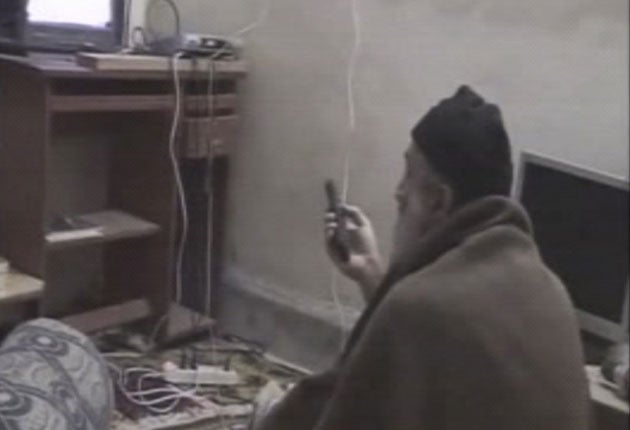Did Bin Laden really have secret porn stash?
Claim by US officials provokes widespread ridicule and suspicion

Your support helps us to tell the story
From reproductive rights to climate change to Big Tech, The Independent is on the ground when the story is developing. Whether it's investigating the financials of Elon Musk's pro-Trump PAC or producing our latest documentary, 'The A Word', which shines a light on the American women fighting for reproductive rights, we know how important it is to parse out the facts from the messaging.
At such a critical moment in US history, we need reporters on the ground. Your donation allows us to keep sending journalists to speak to both sides of the story.
The Independent is trusted by Americans across the entire political spectrum. And unlike many other quality news outlets, we choose not to lock Americans out of our reporting and analysis with paywalls. We believe quality journalism should be available to everyone, paid for by those who can afford it.
Your support makes all the difference.Among the material seized by US Navy Seals at Osama bin Laden's compound in Abbottabad, Pakistan, was a "sizeable stash" of pornography, US officials have said.
The statement brought instant ridicule from bloggers, many of whom found the claim either risible, or a further example of unsophisticated briefing which was likely to backfire. A report on the American-owned Associated Press said: "The disclosure that US investigators found pornography... fuels the US narrative that Bin Laden was not the respectable or noble figure that his supporters embraced" – words that bear the imprint of a spin doctor.
Roderick T Long, a professor of philosophy at Auburn University, Alabama, and a mainstream blogger, wrote: "I have no problem believing that Bin Laden was a hypocrite. But I also have no problem believing that the US government is a liar. Hence I have no opinion one way or other as to the existence of Bin Laden's alleged porn collection."
The pornography was in computer materials, but there was, officials conceded, no evidence that the terror leader had viewed it. Three other men lived in the compound: Bin Laden's son, and two couriers. Bin Laden's three widows are unlikely to shed any light on the matter.
Meanwhile, members of Pakistan's parliament criticised the US yesterday for the raid that killed the al-Qa'ida chief almost two weeks ago, and demanded that an independent commission probe the debacle instead of one led by the country's powerful armed forces. The parliamentary resolution followed a rare, private session with top military officials that began on Friday and ran into yesterday. During the session, Pakistan's intelligence chief, Lt Gen Ahmed Shuja Pasha, indicated he would quit if MPs demanded it, but no one did.
Lt Gen Pasha apparently spoke at length, and defended the military's record in fighting Islamist movements. Pasha admitted negligence in tracing Bin Laden but noted that Pakistan had co-operated with the US in helping kill or capture numerous Bin Laden allies, severely diminishing al-Qa'ida's terrorist infrastructure.
When asked why the CIA was able to track Bin Laden, the spy chief said the US agency acquired more human sources in Pakistan than the Pakistani agencies because it paid informants better, according to a lawmaker who attended the session. "Where we pay 10,000 rupees ($118), they pay $10,000," the lawmaker described Pasha as saying. The MP spoke on condition of anonymity because the session was supposed to be confidential.
Bin Laden died in a post-midnight raid on 2 May at his hidden compound in the Pakistani army town of Abbottabad. US Navy Seals shot him in the head and chest after he ducked away from the raiders into his bedroom – possibly to reach for a weapon. After they killed him, they confiscated what US officials called a "treasure trove" of information from his office. The items included a handwritten journal, five computers, 10 hard drives and 110 thumb drives seized at the site. All the media taken from the site is being analysed by a CIA-led team.
The material includes a record of emails that were sent by flash or thumb drives, carried out by couriers on foot, and transmitted at internet cafés, giving Bin Laden access to al-Qa'ida's offshoots inside Pakistan, and as far away as Yemen and Europe.
Join our commenting forum
Join thought-provoking conversations, follow other Independent readers and see their replies
Comments